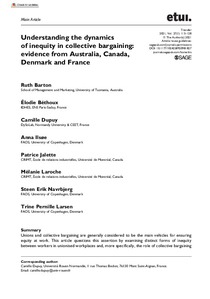Understanding the dynamics of inequity in collective bargaining: evidence from Australia, Canada, Denmark and France

Barton, Ruth ; Bethoux, Elodie ; Dupuy, Camille ; Ilsøe, Anna ; Jalette, Patrice ; Laroche, Mélanie ; Navrbjerg, Steen ; Larsen, Trine Pernille
Transfer. European Review of Labour and Research
2021
27
1
February
113-128
labour relations ; collective bargaining ; trade union ; equal rights ; workers rights
Australia ; Canada ; Denmark ; France
Labour relations
https://doi.org/10.1177/1024258920981827
English
Bibliogr.
"Unions and collective bargaining are generally considered to be the main vehicles for ensuring equity at work. This article questions this assertion by examining distinct forms of inequity between workers in unionised workplaces and, more specifically, the role of collective bargaining in creating, maintaining, reducing or avoiding them. Based on a study conducted in Australia, Canada (Québec), Denmark and France, the situations of inequity examined are related to employment and working conditions, and favour one group of workers over another group of workers performing the same tasks in the same workplace. To better apprehend these dynamics and distinguish between different situations, we develop an analytical framework to capture them. Then, we focus on one example observable in each country: two examples of inequity based on date of hiring (Canada and Australia) and two based on employment status (France and Denmark), showing how the four ideal-type processes interact in each national context. Based on an analysis of these examples, we demonstrate the segmentation between core and non-core employees, along the lines of segmentation theory, but also within groups of insiders or core employees and the key factors that explain how the collective bargaining process can lead to inequity: time, balance of power, and workplace institutions."
Digital
The ETUI is co-funded by the European Union. Views and opinions expressed are however those of the author(s) only and do not necessarily reflect those of the European Union or the ETUI.